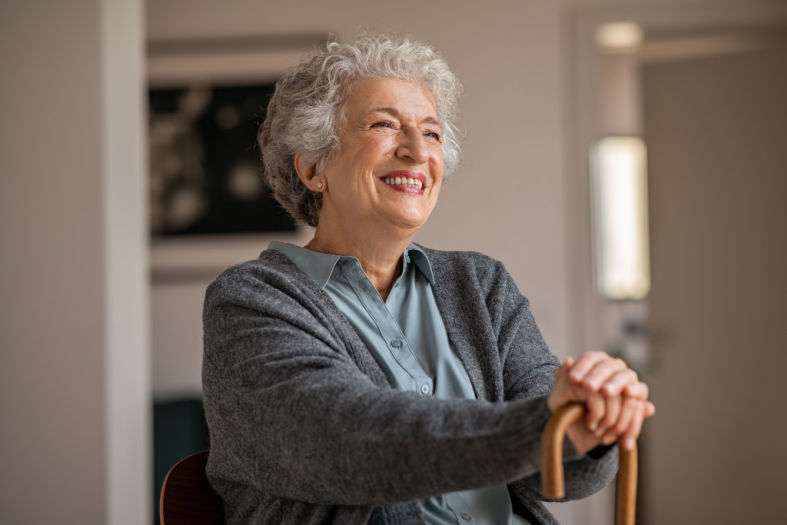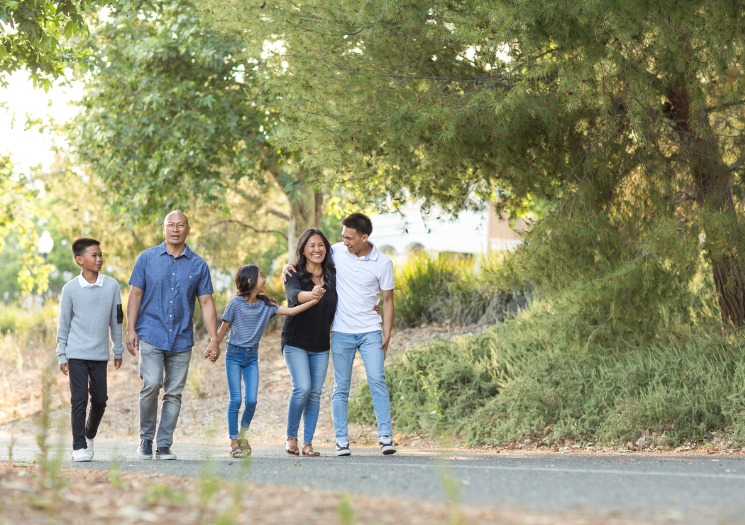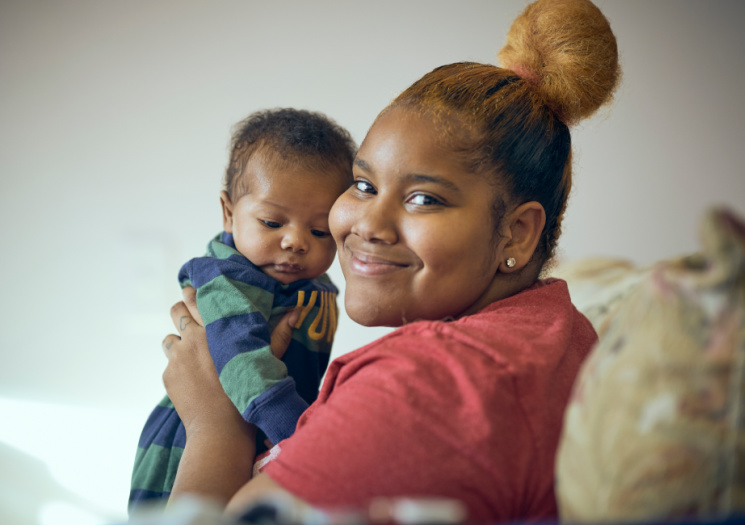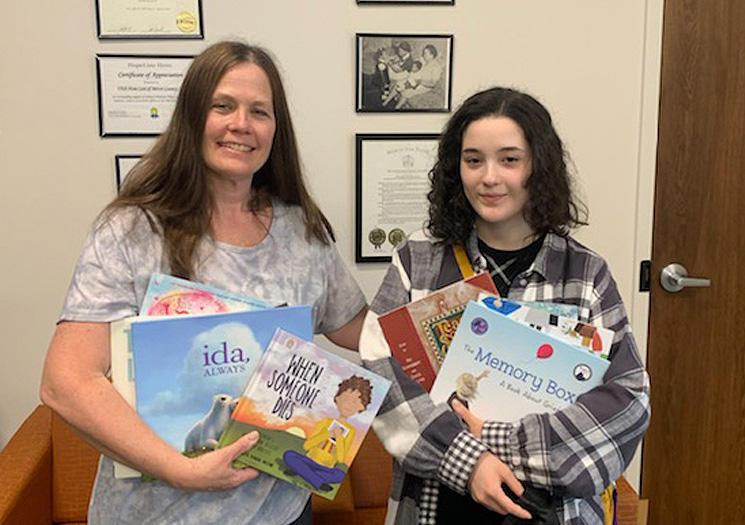- Find a Provider
-
Services
-
Redeemer Health provides compassionate care across every stage of life.
- View all Services
-
- Patients & Visitors
- Locations
- Careers
categories:

We spend a great deal of time in our homes, especially so in the last two and a half years. While we consider our home a safe space, it is not without its fair share of risk, especially for seniors. According to the National Institute on Aging, six out of every 10 falls happen in the home. With September being Falls Prevention Month, here are some tips that you can use to easily fall-proof your home.
Avoid Clutter
First and foremost, keep hallways and stairs clear of any kind of clutter. Avoid keeping papers, clothes, books, and shoes in these areas as they present hazards. Keep electrical wires and cords away from these areas, as well. Wire covers or cable staples could assist with this by fastening the wires to an area of the wall and out of the way of walking paths.
Furniture can also present fall hazards, so ensure your furniture is organized efficiently and out of the way of any walking areas. Also, keep a close eye on your pets and where they are walking. Dogs and cats, no matter the size, could easily become tripping hazards.
Lighten Up Your Home
Lights throughout your home are critical for you to see any potential hazards. Consider having light switches at the top and bottom of stairs, as well as at both ends of hallways. Night lights in both your bedroom and bathroom provide additional support, especially during the evening hours.
Having a flashlight on hand by your bed is also crucial in case the power ever goes out in your home. Of course, just having these lights in place isn’t enough. Be sure to use them to avoid any potential falls.
Other Tools to Help Prevent Falls
There are several other tools that can help prevent falls, especially for use in the bathroom, which is the most dangerous room in your home for falls. Consider installing grab bars in showers and alongside the toilet, in addition to a raised toilet seat with handles. Tub/shower seats will also aid in preventing falls. Non-slip mats should also be used in your bathrooms, in addition to non-skid mats and strips throughout the other rooms of your home.
Consult with your primary care physician on whether or not canes or walkers would be beneficial for you. These devices help promote both safety and independence. An occupational therapy or physical therapy program could also be recommended. These programs improve and restore mobility, movement, strength, flexibility, balance, and coordination.
Did you know that Redeemer Health Home Care offers a fall risk home assessment program called Life Assess? Through this program a nurse visits your home to assess hazards within your home. We:
- Recommend simple home modifications to reduce risks of falls, like removing tripping hazards.
- Assess medications and blood pressure that may be causing falls or imbalance issues.
- Provide exercises to improve balance and strength.
- Provide strategies to address low vision.
- Provide strategies to help reduce falls at night and in the bathroom.
- Recommend any needed equipment and footwear to keep you safe in the home.
If you have questions about Redeemer Health Home Care, please visit our website, redeemerhealth.org/homecare, or call 888-678-8678.
categories:

Walking is one of the most accessible forms of exercise. Other than a sturdy pair of sneakers, you don’t need any special equipment, and the activity offers a multitude of health benefits. Plus, it’s free!
“Walking is such good exercise for most people because it is our most basic form of transporting the body,” says exercise physiologist Robert Catalini, manager of the Health and Fitness Center and Pediatric Rehabilitation at Redeemer Health.
Before starting on a walking regimen, Catalini says, people with conditions such as heart disease, hypertension, diabetes, or a history of stroke should get an all-clear from their doctor. And those who aren’t used to exercise should start gradually, perhaps with a five-minute stroll to the end of their block and back. Then go a little farther the next day. “Gradually increase your time,” Catalini says. “There’s no rush. Getting some form of exercise is better than nothing at all.”
Need incentive to get moving? Consider the following benefits.
- Trim excess inches: Being overweight can predispose you to other health issues. Walking a mile—which takes 15 to 30 minutes—burns about 100 calories. That means if you walked a mile every day, you would burn 36,500 calories in a year, which translates to losing 10 pounds. Plus, studies have found that walking reduces cravings for sugary foods.
- Improve heart health: A brisk daily walk elevates your heart rate and reduces your risk of problems such as high blood pressure, high cholesterol, heart attack, and stroke. Walking daily has been shown to reduce the risk of heart disease by 30 to 50%, but walking even a few times a week reduces that risk by 15 to 20%.
- Lower blood sugar: When you walk, your muscles use more glucose, the sugar in your bloodstream. Over time, this can lower your blood sugar levels. It also allows insulin to be used more effectively.
- Boost your mood: Joggers talk about the “runner’s high,” but you also can get a psychological boost from moving at a slower pace. Walking is reported to increase happiness and reduce anxiety, and a 2019 study published in JAMA Psychiatry found that walking for an hour a day can reduce your risk of major depression.
- Add years to your life: Walking is linked to a longer lifespan. A major study published in 2020 in JAMA found that the more steps participants over age 40 took, the lower their risk of dying from any causes. Taking into account subjects’ health, researchers found a 51% lower mortality risk for those who took 8,000 steps a day compared with those who took 4,000.
Walking is also known to reduce pain and boost your immune system. "The exercise is like medicine," Catalini says.
He encourages individuals to come up with a walking program to suit their physical condition, schedule, and lifestyle. "If it doesn't fit your lifestyle, you're not going to continue it," he says. "Your walking program becomes part of your lifestyle by being part of your routine."
Having a walking buddy or belonging to a walking group can help get you out the door. “If you have friends or neighbors that you can say, ‘Hey let’s go for a walk,’ I think that’s a great thing to do,” Catalini says. “Now it becomes a social thing as well as a physical thing.”
Walkers also can get their steps in while supporting a worthy cause at events such as the fundraising walks Redeemer Health will hold this fall at Bryn Athyn College. The Kohl's + Redeemer Health NICU 6K Walk /Run on September 24 will support Redeemer’s Neonatal Intensive Care Unit. The Hope is Here: 2022 Breast Cancer Awareness Walk on October 15 will support the breast health programs at Redeemer Health in partnership with MD Anderson Cancer Center at Cooper.
Wherever and whenever you elect to walk, Catalini offers the following tips to help ensure a safe and positive experience:
- Invest in proper footwear. The professionals at your local running store should be able to help.
- Consider walking indoors, on a treadmill or at a mall, during inclement weather.
- Avoid walking in the middle of the day in the summer, when it tends to be hottest.
- Be sure to hydrate.
Now all that's left is to take the first step.
categories:

Pregnant with twins, Cassandra first noticed pain in her right shoulder about 27 weeks into her pregnancy. The pain subsided, but within a few weeks the pain returned even stronger.
The extreme pain led Cassandra to Holy Redeemer’s Labor and Delivery Unit, where we diagnosed her with a form of pre-eclampsia known as HELLP (Hemolysis, Elevated Liver Enzymes and Low Platelets).
Cassandra’s platelet levels were going down and her liver function was failing. She remembers the caring hospital staff doing everything they could. “They tried as much as possible to prolong the pregnancy, but it just wasn’t going to happen,” she said.
Cassandra’s twins were born at 29 weeks and a day—about 11 weeks premature. Logan weighed 2 pounds, 15 ounces. And Michael was just 2 pounds, 6.7 ounces.
Logan was intubated and sent immediately to Holy Redeemer’s Neonatal Intensive Care Unit (NICU). Michael was placed on continuous positive airway pressure (CPAP) therapy and transported to the NICU, where he was eventually intubated.
For every precious baby we welcome into the world, it's our mission to send them home as safe, healthy, and as fast as possible. For Logan and Michael that journey home took 62 days in our NICU.
Looking back, Cassandra feels a roller coaster of emotions, but only positive memories of the exceptional care the boys received while in the Holy Redeemer NICU. The doctors and nurses became like family to both her and her husband, providing their boys both compassionate and state-of-the-art care.
Part of the care Cassandra is especially grateful for are the “giraffe beds” both boys stayed in during in their first few weeks of life. The beds are designed to model a mother’s womb as it relates to things like temperature and humidity--keeping premature babies warm, keeping their delicate skin in good condition, and allowing them to grow in an optimal place.
Since Cassandra was recovering from a C-section, the beds could adjust so she was able to see and touch the boys with ease.
“Because I was recovering from a traumatic delivery, staff were able to lower the bed, so I was eye-to-eye with the boys. I could reach in the side to take part in their care even though I couldn’t stand at the time. That meant the world to me,” Cassandra said.
The beds also raised and lowered to allow the NICU staff to monitor, weigh, and even X-ray the boys without having to remove them from their beds. Keeping them in place reduced their risk of complications from environmental changes.
Plus, as Cassandra notes, it kept from having to disturb them. “At 29 weeks, every little bit of energy they have to expend is huge, so not having to expend that energy moving was important for them,” she adds.
Today, the twins are nearly seven months old and healthy and happy at home with mom and dad. And Cassandra is grateful for those who have contributed to make giraffe beds possible at Holy Redeemer Hospital, as she knows those beds made their difficult journey that much easier.
Now the Redeemer Health community is coming together to fund an additional Giraffe Omnibed Carestation for our NICU. Funds raised from our upcoming Kohl’s + Redeemer Health 6K Run/Walk on September 24th will help. We invite you to register or donate today by visiting runsignup.com/gotheextramile.
categories:

(Philadelphia, PA) – An alliance composed of Temple Health, Redeemer Health, and Philadelphia College of Osteopathic Medicine (PCOM) has signed a definitive agreement whereby a newly formed entity owned by the Alliance will acquire Chestnut Hill Hospital as part of an asset purchase transaction with Reading, PA-based Tower Health pending review and approval by regulators and the Tower Health bond holders.
“Together, our organizations bring the expertise, resources, operational excellence and skilled clinical care to ensure that Chestnut Hill Hospital remains a durable and sustainable resource for the eastern Montgomery County and northwest Philadelphia communities,” said Michael A. Young, MHA, FACHE, President & CEO of Temple Health. Temple Health will manage the newly-named Temple Health-Chestnut Hill Hospital following the acquisition.
Temple Health, Redeemer Health, and PCOM formed the Alliance to pursue collaborative affiliations that will benefit patients and add value to the communities they serve. “Our collaborative affiliation promises continued success for our organizations and those we partner with, and more importantly, for the patients and communities we serve,” said Michael B. Laign, President & CEO of Redeemer Health.
“This endeavor will help strengthen PCOM’s clinical and graduate medical education capabilities and enhance our ability to train the next generation of health professionals,” said Jay S. Feldstein, DO, President and CEO of Philadelphia College of Osteopathic Medicine. “Most importantly, Chestnut Hill Hospital will continue to serve as a critical resource for the surrounding communities.” Chestnut Hill Hospital has served the northwest Philadelphia and east Montgomery County area for more than 100 years.
“Tower Health is pleased and grateful that Chestnut Hill Hospital will continue to serve the community as part of an alliance of highly-respected and locally-based non-profit healthcare institutions,” said Tower Health President and CEO P. Sue Perrotty.
categories:

Through Drueding Center’s annual Stairway to Our Future, the generosity of donors brought in more than $200,000 dollars to help the Center, an entity of Redeemer Health, continue its critical work of helping young families experiencing homelessness heal from trauma, restore hope, and end homelessness.
To keep all participants safe during the ongoing pandemic, the event was held virtually. While this is a relatively novel format, it successfully continued Drueding’s tradition of sharing with donors the significant impact of their generosity.
“In order for me to grow as a mother and as a young woman I had to really be open, not just with everyone here, but with myself and what I needed help with,” shared Siana, a Drueding resident for 14 months. “Drueding Center does not just focus on housing. They also help you find work. They help you get your kids in school. They assist you with everything. They helped me get on my two feet to be independent.”
Drueding Center resident Daijah shared an important goal she wanted to achieve now that she and her one-year-old daughter have stability: “I want to go back to school to get my GED. At the time, instead of bettering myself getting an education, I had to choose work over getting my high school diploma.”
Drueding Center Has Helped More than 11,000 Individuals Since Its Founding
Through the ongoing support and kindness of donors and grantors, the Center has helped more than 11,000 individuals since its founding 35 years ago. Today, its many programs provide access to:
- Transitional housing for homeless parents between the ages of 18-24 who have one or more young children
- Referrals for job training, continuing education, childcare, legal issues, and other social services
- Advocacy to assist with landlord disputes, subsidized housing, social security, child support, and mental health
- High-quality childcare
- Case management support after they move to permanent housing
- A food pantry featuring a wide range of nutritional items
“The pandemic revealed that our commitment is more important than ever to those who come to us for the support and encouragement Drueding Center and its resource network has been providing for decades,” said Drueding Center Board Vice Chair Linda Perkins. “Every day I am so grateful for such good work being done in Philadelphia.”
“We’re incredibly grateful for our Stairway donors, who help us make a difference in the lives of everyone we serve,” added Anne Marie Collins, Drueding Center’s Executive Director. “Thank you for working together with us to do great things.”
To learn more about Drueding Center, explore volunteer opportunities, or make a donation, druedingcenter.org.
categories:

Stay informed on the latest news and updates from Redeemer Health. Join our list now!
categories:

Recognized every June, Men’s Health Month reminds us of the value of awareness, prevention and education. Some of the most valuable tools available to men as they age are health screenings that can detect issues early.
Advice and information is all around, but let’s let the process begin with us. Our doctors can help us understand which health screenings are specifically indicated for men of our age and risk. Doing some homework about recommendations can prepare us for those conversations.
Recommendations from the U.S. Preventive Services Task Force, an independent voluntary panel of experts in primary care, prevention and evidence-based practice, include a roster of screenings that are appropriate for men of any age. They include alcohol use disorder, depression, hypertension, obesity, tobacco use, HIV, Hepatitis B and C, syphilis, and lipid disorder.
Screenings recommended for men of specific ages include a colorectal cancer screening at age 50, lung cancer screening at 55 for current or past smokers, and abdominal aortic aneurysm screening at 65 for men who have ever smoked. Recommendations regarding prostate cancer screenings vary, so doctors can help us understand the benefits of digital rectal exams and prostate-specific antigen tests.
Additional conversations may include diabetes, skin cancer prevention and a diet designed to prevent cardiovascular disease. There is no routine screening test for testicular cancer, but doctors can show us how to properly examine ourselves for suspicious symptoms.
Our doctors also can help us identify which vaccines we may need to re-dose or boost. Vaccines for flu and COVID-19 are top of mind these days, but we should ask about vaccines for pneumonia, Tdap, shingles, meningitis, chicken pox, and Hepatitis A and B.
To find a doctor who is right for you, visit our provider directory or call the Redeemer Health Physician Referral Service at 800-818-4747.
categories:

This reflection was written by Julie Chamberlain, MSW, LSW, a hospice social worker at Redeemer Health.
As a hospice social worker, I am always looking for resources that could be beneficial to our patients and families as they process the multitude of feelings that arise during the grieving process. I was thrilled when I received a call from Barbara Tonetti asking if her daughter, Julia, could organize a collection of children’s books to be donated to the bereavement program at Redeemer Health Mercer Home Care.
Barbara spoke kindly as she reflected on her family’s own personal history with us, saying, “Holy Redeemer is a special place for me and my family. Actually, Julia and I were both born at Holy Redeemer Hospital. When Julia was born, she had to spend some time in the NICU. I will never forget our time in that unit.”
Julia is now a junior in high school, and thriving. As Barbara and Julia were pondering volunteer projects that Julia could do for her National Honor Society community service hours, they spoke with members of their community. It was during a discussion with their neighbor, fellow Redeemer Health Mercer Home Care social worker Sara Organic, that the idea for the book collection began to take root.
Julia’s planning soared from there, and she researched children's books that focus on death, loss, coping, and grieving. Then she requested book donations and monetary contributions to help buy books. Eventually, Julia collected 21 books, which she and Barbara proudly dropped off at our office in May.
They told us how books have been a source of support for them through their own experiences with loss. Barbara explained, “Julia was little when my mother was dying. And you know, kids don’t always want to sit down and read, so I picked up children’s books focused on what was happening, and I would read aloud in my mom’s room. I knew my mom could hear my voice, but I also knew that Julia was listening, even if she was playing. The words from those books were helpful to all of us during that time…so these books are not just a resource for children.”
Our hospice team is extremely grateful for the time, planning, and effort that Julia put into this project, and I am confident the books she collected will be helpful to many people for years to come.
